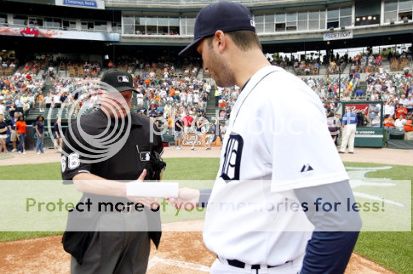
Humility & Grace turn a heavy moment to light. Sancya/AP
Last night, Umpire James Joyce made a horrifically bad call and robbed Detroit Tigers pitcher Armando Galarraga of a perfect game:
Yeah, a horrible call. Yes, Galarraga was robbed, and Joyce will live with his mistake. That’s the nature of the game.
Now comes the debate: What should Baseball do? Should MLB Commissioner Bud Selig reverse the call? and award the perfect game to Galarraga? That question is being debated, right now.
Michigan Governor Jennifer Granholm has issued a proclamation that Galarraga threw a perfect game.
Last night, on twitter, a passionate debate raged. A seeming majority demanded that replay be introduced to regular-season Baseball. “Limit it to three challenges a game,” someone wrote. There was a lot of talk about “justice” and “fairness.” People wanted to feel better about what had just happened. They wanted those in authority to “fix it,” so that no one would feel badly; not Galarraga, not Joyce, not the fans.
I and a few other hardy voices were raised in disagreement, arguing that introducing replay to Baseball will ruin the game; it will steal its soul.
To submit the human mistakes (and the opportunity to rise above them) that make baseball so magnificent to the cut-and-dry legalism of replay is a misguided notion; it demonstrates how comfortable our society has become with recourse to the courts, with the idea that life–which is not fair–can somehow be made fair, by dint of authority.
After last night’s game, Joyce admitted his mistake. He sought out Galarraga and his manager, Jim Leyland, and owned it.
That’s manly, and graceful.
Galarraga, in turn, showed enormous class and grace in return, forgiving the umpire.
Character on display. You don’t get to see it when replays are enforced. Ruling by replay sends everyone to the tape and there is no human interplay between the wrong, who admit it, and the wronged, who accept the admission and then let it go.
Just moments ago, as today’s game began, Leyland had Galarraga bring the line-up card to the umpires, at home plate.
The ump behind the plate? Jim Joyce, who accepted the card with tears streaming from his eyes. Galarraga stood there, beautifully attuned to the moment and the man, while most of the crowd–understanding what baseball is, and that they now had the opportunity to be part of something bigger than a mere game–stood in the stands, and heartened both men with their applause.
You can watch it from a different angle here. The picture may become iconic. What a moment!
People always say if you pitch a perfect game you are a part of baseball history. Well how many of those 21 players can you really name? Off the top of my head I can think of 5 (I honestly don’t remember the guy who did it on Mother’s Day of this year for Oakland).
Now, how soon are you likely to forget Galarraga and the example he is setting with his reaction?
On ESPN, a commentator watched and said, in an awestruck voice; “a terrible story just keeps getting better and better.”
Yeah. That’s baseball.
The home-plate encounter between Galarraga and Joyce was one of those transcendent moments which happen more often in baseball than in any other sport, because baseball is much more than a game.
Baseball is the teacher of lessons in courage, perseverance and grace. It pits one man, batter or pitcher, against an entire team and says “show us your heart.” Then, as Bart Giamatti wrote, “it breaks your heart,” because it is designed to do so.
But baseball then mends the heart it has broken, and in the most magnificent ways, in ways that uplift players and fans, alike.
Because baseball has no replay, the “bad calls” are part of the game, and because they are, so is the paradoxical transcendent lightness that comes from a heavy moment being shrugged off and allowed to pass.
Watching the game with your kids, you can point to a player who has been robbed of a hit, or a homerun, or an out, or a stolen base, or a perfect game, and you can say to them, “that was tough. Life is not fair, but see how this player is handling it. He’s not letting it take him down or own him; he is going forward with the rest of the game, because he knows that this is just one moment. He’s not getting stuck in it, because he knows that maybe another time, another game, a bad call will actually go his way. Things even out, in the end.”
Such moments are good for baseball, and it is good for the nation. Humility in error (or in the face of unfairness) and manly good-will are things we no longer see in a world full of puffed-up egos. They are examples we need to see lived out before our eyes, more often.
Imagine last night’s game, with replay. The “moment” is lost and cannot be manufactured. Galaragga gets a historic perfect game and walks off the mound, vindicated, but it’s an anti-climatic thing. Joyce gets corrected and overturned. It’s all “fair” but cold. There is no need for human interface; no need for apologies, or for forgiveness, because “it’s just a game.” Humanity is taken out of the equation. Athletes who no longer have to consider sportsmanlike behavior will be free to puff up the chest, and despise the umpire. Umpires, feeling emasculated and underappreciated, will begin to despise the players and grow more bitter with each overturn.
And none of that is anything like baseball. The lesson our kids learn? You don’t have to work anything out with someone who has wronged you, or own up to anything you’ve done wrong. Just take it to court.
What an unhelpfully bleak lesson.
If we have lost sight of how important it is to have visible examples of perseverance and forgiveness, of “letting go” and even surrender (the players, after all, go into the game understanding that all of their dreams will not come true, but willing to take the chances offered), then we are on a very unhealthy path, one that says only, “fix it, make life fair.”
Falling prey to the illusion that life can be “made” fair, when it demonstrably is not, we will lose our fortitude, and our ability to go on in difficult times.
Are we ready to give up the magnificent humanity in this game, and its insistent, optimistic lessons that life is a bit of a crap-shoot, but that you play it faithfully, rolling with the bad, giving thanks for the good, and looking forward to the next inning? I am not. And I bet most of the players are not, either.
Perhaps it is only wishful thinking on my part, but I believe it will be the players, themselves, who stop replay from becoming the arbiter of regular-season baseball. They’re the ones who sign on to play a game so fraught with humanity and drama. They understand all that will be lost, by going to the videotape.
I’m pretty sure I will always be in the minority, but let’s take a couple polls, anyway:
UPDATE: Selig says MLB will not reverse the call, but note this further down:
Tigers manager Jim Leyland said MLB gave Joyce the option to not work Thursday’s game between Detroit and Cleveland, but Joyce chose to stick with his job behind the plate.
That’s Courage
Galarraga bitterly sipped a beer minutes after the blown call negated his place in baseball history. An apology and hug changed his attitude. Joyce, in tears, asked for a chance to apologize after the Tigers beat the Indians 3-0.
“You don’t see an umpire after the game come out and say, `Hey, let me tell you I’m sorry,”‘ Galarraga said “He felt really bad. He didn’t even shower.”
That’s grace
Over at Inside Catholic, Joseph Susanka has a terrific collections of links featuring some good writing on this game and the aftermath.
Related:
Ross Douthat is also against the replay
Kim Priestap: Vehemently disagrees
Newsweek: The Greatness and Perfection of Missing the Call
Daily Beast: Ten Worst Calls in Sports
The Sad Similarities between Geeks and Sports Fans Via
A reasonable argument for replay, via Jimmie Bise











